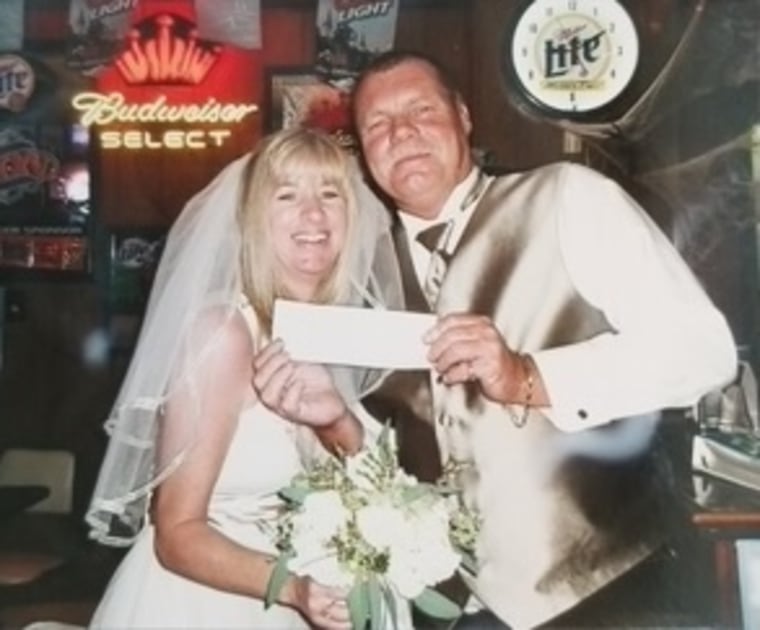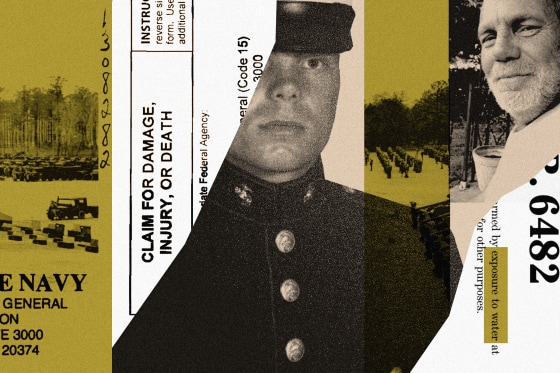The sicknesses emerged one by one.
First came heart problems and skin cancer in 2017. Then, within four years, Terry McClure was diagnosed with Parkinson’s disease, prostate cancer and lung cancer.
McClure had served at Camp Lejeune, a sprawling Marine Corps training facility in North Carolina, where up to 1 million people may have been exposed to a drinking water supply contaminated with chemicals from 1953 to 1987, according to federal health officials.
His family blamed the contamination, which has been linked to severe health problems. The veteran joined thousands of victims who filed claims under the Camp Lejeune Justice Act, which expedited litigation when it was signed into law in 2022.
But nearly a year later, while his case remained stagnant, McClure, 65, died.
“It just broke his whole body down,” his wife, Denise, said. “I grieved over what they did to him and what they put us through.”

Days before the final deadline to submit claims for damages under the law, few people who say they were poisoned at Camp Lejeune have received the justice they sought, data shows.In the last two years, the Navy, which the Marine Corps is part of, has received more than 320,000 claims and has settled 64 of them, Navy spokesperson Joe Keiley said.
The total number of claims surged from about 93,000 in September, although Keiley said duplicate cases make up a “significant” portion of the current tally and that the Navy “remains committed to resolving as expeditiously as possible all valid claims.”
The lack of progress has frustrated many who say they have been sickened by one of the largest water contamination cases in U.S. history.
“It’s great that they passed the act, but now the act has to be fulfilled,” said Peter Romano, who was stationed at Camp Lejeune from 1986 to 1988 and was diagnosed with testicular cancer.
“It’s like opening up a store, but you never really open the store, and the only thing we can do is walk past and look at it,” Romano, 57, added.
On Aug. 10, 2022, President Joe Biden signed the PACT Act, the “most significant expansion of benefits and services for toxic exposed veterans in more than 30 years,” according to the White House.
A provision of the bill allowed people exposed to contaminated water at Camp Lejeune to file new lawsuits in the Eastern District of North Carolina if they have waited longer than six months for the Navy to resolve or respond to their initial claim.

With the Aug. 10 deadline fast approaching, at least 2,067 Camp Lejeune Justice Act cases have already been filed there so far, according to the court’s clerk, Peter Moore Jr.In September, the Justice Department and the Navy announced a voluntary “streamlined process” to resolve claims in which the Navy makes settlement offers — from $100,000 to $550,000 — based on specific diseases and the duration of time spent at Camp Lejeune.
Of the 109 settlement offers extended to claimants, 64 have been accepted so far and three were declined, Keiley said. The rest of the claimants have yet to respond, he said.
Andrew Van Arsdale, an attorney representing more than 9,000 Camp Lejeune claimants, said his firm has resolved 15 cases with the Navy in two years. Meanwhile, more than 2,200 of his clients, including McClure, have died while waiting.
“The progress is insultingly slow,” he said. “At the pace we are going, it will only be the descendants of these sick men and women that will still be around to see the end.”
Denise McClure, 62, of Louisville, Kentucky, said she thought she had many years left with her husband even after he was diagnosed with Parkinson’s disease in 2019.
But on March 6, 2023, he went to the hospital after a bad fall and died there from septic shock, pneumonia and renal failure, according to his death certificate.
“I thought he was coming back,” Denise said.
For more than 30 years, multiple sources contaminated Camp Lejeune’s supply wells, including waste from a nearby dry-cleaning facility and leaks from underground storage tanks on base, according to the Agency for Toxic Substances and Disease Registry, which is part of the Centers for Disease Control and Prevention.
There were extremely high levels of trichloroethylene, tetrachloroethylene, vinyl chloride and benzene — colorless chemicals that can cause several diseases, including cardiac defects and some cancers, the agency said.
Terry McClure was a baker at Camp Lejeune and lived on base, where he drank, swam and bathed in the water and used it to cook from 1976 to 1978.
“By the time he realized that the water was contaminated, the only memory he had was about how it smelled bad,” his wife said.
Under the Camp Lejeune Justice Act, victims can pursue litigation against the government if they could prove they were at the base for at least 30 days during the contamination time frame and that the exposure to the tainted water likely caused their health issues.
The Department of Veterans Affairs said evidence shows a link between the chemical exposure at Camp Lejeune and some conditions, including Parkinson’s disease and several cancers.
McClure had wanted $10 million from the government for personal injury. Denise said that would have paid for a larger wheelchair-accessible home, which she said would have drastically improved her husband’s living conditions while he was alive.
Nearing the end of his life, he had lost muscle strength and frequently fell. The lack of mobility confined him to a tiny bedroom, she said.
“With each new diagnosis, things got worse and worse,” she said. “Now, all I can fight for is the people who are alive.”

